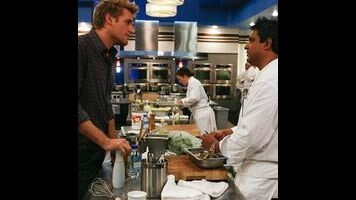Top Chef Masters: "Masters Get Schooled"

Hello, and welcome to the bizarre world Top Chef—or as Bravo has labeled it, Top Chef Masters. You’ll find that it looks a lot like Top Chef—what with the spooky remix of the opening credits score, the Quickfire and Elimination Challenges, and at least the promise of Gail Simmons appearing as a judge at some point—but everything is a little bit off. The host, Kelly Choi, doesn’t appear like the sort to hike up her skirt to make way for a Carl’s Jr. burger, and the other judges (Gael Greene, James Oseland, Jay Rayner) all appear to be informed, experience critics and tastemakers who aren’t interested in stretching for that canned Toby Young bon mot. The contestants—all professional, established, awards-trumpeting executive chefs—are a thoroughly collegial lot, not given to the backbiting of ambitious but unproven novices in the culinary world.
To put it bluntly then, Top Chef Masters is Top Chef without the drama. If that sounds like a harsh assessment, I actually don’t mean it to be. The main reason I’ve always favored Top Chef over other reality shows is that it’s a meritocracy; personality clashes, however entertaining they might be, have no bearing on the end result, which is all about the food that make it onto the plate. In fact, my least favorite Top Chef season, Season Two, was also the most contentious; I felt the drama sparked by Marcel, Ilan, and company were ultimately an annoying distraction from what appeared to be a lot of mediocre-seeming dishes. So I imagine Top Chef Masters will appeal to the wonkiest food nerds among us; others can stay tuned to The Real Housewives Of Long Island, or whatever it is that Bravo is running in heavy rotation these days.
Just to be clear about the parameters of this “culinary clash of the titans,” it features 24 big-time chefs battling it out over 10 episodes: The first six will be like tonight’s hour, pitting four chefs at a time against each other, with the winner advancing to the “Champion’s Round” and earning $10,000 for their favorite charity. The remaining four episodes will presumably play out like the endgame of a normal Top Chef season, until the winner comes away with $100,000 in charity cash. And based on Hubert Keller’s triumphant performance, I’m guessing the homestretch is going to feature some pretty astonishing cooking.
Though I by and large enjoyed Top Chef Masters quite a bit, the show does have a few inherent problems beyond the lack of squabbling (which again, doesn’t really bother me). To name a few:
• The nutty 25-star rating system. Because the first six rounds all feature different contestants, with only one surviving, Quickfire Challenge winners obviously cannot be granted immunity and it would be equally problematic to give the Quickfire winner a quirky “advantage” heading into the Elimination Round. So some kind of point system makes sense, as do the “stars,” which are oh-so-important in the vaunted Michelin guide. But the endless recitation of ratings was both tedious and a little confusing, since the Quickfire operates on the five-star scale and the Elimination on a four-star scale. (Incidentally, it’s weighted to where Quickfire ratings are 20% of the total, so a win there is more of a slight head start than a whopping advantage.)
• The judges are pulling their punches. The 24 chefs who signed onto the show have reputations to uphold—and besides, they’re playing for charity, not $100,000 in seed money for their theoretical restaurants. Though I thought the judges overall did a fine job suggesting more subtly which dishes worked and which didn’t, you would never hear a qualifier like “If you consider the fact that it was cooked on a hot plate…” on Top Chef. And I don’t expect anything close to Anthony Bourdain-like colorful rancor.
 Keep scrolling for more great stories.
Keep scrolling for more great stories.
